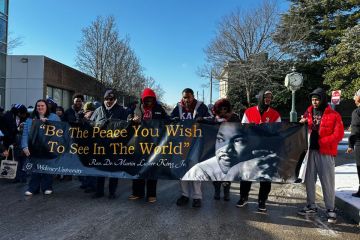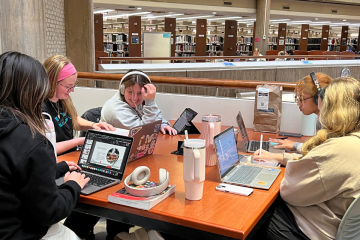A Legacy of Care: Chester Community Clinic Marks 15 Years

When the Chester Community Clinic first opened in September 2009 its purpose was simple: serve the community and give students an exceptional learning experience.
Now, more than a decade-and-a-half later, the clinic has grown in size, scope, and impact, providing access to a diverse line of healthcare services-- physical therapy, occupational therapy, speech-language pathology, social work, clinical psychology, biofeedback and nursing – all within Wollman Hall.
Years of dedication to quality care and strategic transformation have established the Chester-based clinic as an anchor in the community and a celebrated national model for student-led pro bono care and education.
Simple Mission. Big Impact.
This fall marked the Chester Community Clinic’s 15th anniversary. For program leadership who spearheaded the operation, the milestone anniversary was a reminder of the clinic’s success in meeting and sustaining its objective.
The central core of the mission is to both serve and meet a need in the community and give our students an unparalleled experience that prepares them for clinical practice. That's still very much at the core of what we do.” —Robin Dole, dean of the College of Health and Human Services.
Then known as the Chester Community Physical Therapy Clinic, the clinic opened about a mile from campus in Balin Hall. Its creation stemmed from a community assessment that showed local demand for pro bono services for residents without insurance or who surpassed their insurance coverage.
Clinic data reports more than 12,000 physical therapy sessions have been administered since 2009. Those numbers, not including the latest rehabilitation and preventative care services offered, translate to approximately $1.3 million in costs that would otherwise be charged to the medical system, according to available data. More important, those numbers represent the value of services provided to clients who would not have had access to care.

For clients like William Beachem, that access to care was lifechanging.
In 2017, the Chester native turned to the clinic after a devasting motorcycle accident left him with broken femurs and ankles. The injuries required multiple surgeries and rendered Beachem immobile. A team of graduate physical therapy students, under licensed clinical supervision, led Beachem to walk again.
“I’m completely indebted to the students,” said Beachem in a 2018 interview. “Widener has been there every step of the way.”
With personalized and compassionate care as the foundation, the Chester Community Clinic successfully adapted over the years to mirror the evolving healthcare industry and meet local community health needs, gaining national recognition along the way.
The Difference Makers
Pro bono healthcare services are delivered at academic and medical institutions nationwide to enhance the student learning experience through community-based service.
Whereas other institutions are traditionally faculty-operated, Widener’s clinic, with inspiration from the students themselves, designed an innovative model that put students at the helm. The first-of-its-kind model still exists today with a student leadership board tasked with managing the year-round facility.

According to Dole, the program’s culture centered in faculty-student collaboration empowers students to take ownership of the clinic and their experiences within it.
“Many of the innovations of the clinic have come from student ideas and from challenges,” said Dole. “It's not carte blanche, but it is a partnership and without a partnership, we don't have any authenticity to the culture.”
Today, 100% of physical therapy, occupational therapy, and speech-language pathology students participate in the clinic. That engagement drives meaningful change with each incoming class.
They’re the difference makers. That's the beauty of this model is, these students come in, work together, catch a vision, and advance it, leaving their own legacy." —Jill Black, associate dean of the College of Health and Human Services.
It was the class of 2014’s vision that kickstarted a national networking conference that has been held annually at Widener since its conception.

Christine (Guay) Wood ’14, a rehabilitation manager at Lehigh Valley Health Network, recalls her and her classmates identifying a gap in industry network opportunities. Available conferences at the time predominantly focused on medical-based pro bono clinics but paid little attention to the rehabilitation care that they were practicing.
“The idea came about that we run our own conference that can be more geared toward the therapy and rehab realm to better serve our community, and be able to share the knowledge that we have about student-run pro bono clinics that are rehab-specific and outside the realm of the medical side,” said Wood.
Following its inaugural conference in 2013, the network has grown to more than 100 participating institutions who gather biannually to collaborate on research, facilitate connections, and help foster new developing clinics.
“It just is able to show how students can make a big difference in the community,” said Wood.
Students in the class of 2015 continued the expansion with the creation of The Pro Bono Network, an organization to facilitate the advancement of student-run pro bono services across the country.

The Chester Community Clinic’s expansion and efforts began to earn a reputation around the country. At the University of Kentucky Hospital, Aaron Peffer ’11, a Pennsylvania native who relocated down south after graduation, was tapped by faculty who were interested in implementing key components of Widener’s model into their pro bono physical therapy clinic, Samaritan’s Touch.
“We met to discuss the structure that was established at Widener with the student board, which was a pretty unique model at the time,” said Peffer. “They were looking to take what they already had established [at Samaritan’s Touch] and enhance it for the student experience.”
Peffer’s hands-on experience helped the Lexington-based clinic adopt Widener’s student-run framework. Being able to contribute to the Chester Community Clinic’s development and then share its toolkit for success with like-minded programs brought Peffer a deep sense of Widener Pride.
“I felt like what we did at Widener was really special, for sure,” said Peffer.
Widener’s Next Chapter of Pro Bono Healthcare
By 2024, Widener introduced three new graduate health science programs as part of its strategic vision to become an interprofessional powerhouse for health and human services.

Today, the programs converge in the Chester Community Clinic’s facility in Wollman Hall. The clinic’s new home on Melrose Avenue between 16th and 17th Streets was gutted and rebuilt in 2019 boasting state-of-the-art clinical and academic spaces including a new clinic, an Activities of Daily Living suite, the Speech-Language Pathology Clinic, classrooms, client treatment rooms, and more.
“The clinic has become a signature pedagogy for all of our health sciences programs. Having that as a central feature of the curriculum as we built new programs was really essential,” said Dole.
The Widener Community Nursing Clinic is the latest pro bono service to sit within the clinic as of fall 2024. As one of two clinics run by the School of Nursing, its presence in Wollman Hall increases the total number of in-house services available to clients.
Watch Interprofessional Care in Action
“Any client entering into our Chester Community Clinic umbrella can have access to physical therapy, occupational therapy, speech-language pathology, nurse practitioner, clinical psychology, social work services, and more all under this same area, so we're able to provide more comprehensive holistic care for our clients,” said Black.
That integration not only bolsters cross-collaboration across programs, but emulates coordinated care used by clinicians. New exercises such grand rounds, a practice used in hospital systems, allow students like Diane Harley '26, a graduate social work student, to partner with fellow student-clinicians in other programs to learn from and about one another all in pursuit of holistic care.
When treating a client from a single perspective only, it limits the ability to focus on and address all aspects of the client's health. Each of our disciplines has a single focused view, but together we can offer a full spectrum of services.” —Diane Harley '26, graduate social work student.
According to Black, giving students an opportunity to work together in a clinical setting prepares them for the multifaceted environments that they can expect to enter across the healthcare system.
“Our students are now not only getting to participate in their own clinical field as they serve, but they're also doing it in collaboration with these other professional students. They're learning about one another and from one another,” said Black.
With each development, the clinic has been able to build upon its simple mission to produce a complex system of community-based, interprofessional healthcare alongside a national network of academic and industry partners.
Looking ahead, Dole and Black say the clinic’s future will be sustained by its mission and proven agility.
“The clinic is ever-evolving,” said Black. “It doesn't stay the same and it shouldn't stay the same. The students who continue to come to Widener for their professional education will continue to improve upon the service and outreach within this Widener gem.”
Interested in supporting the Chester Community Clinic through a donation? Give directly to the clinic here.
Read Widener Magazine - Fall 2024



